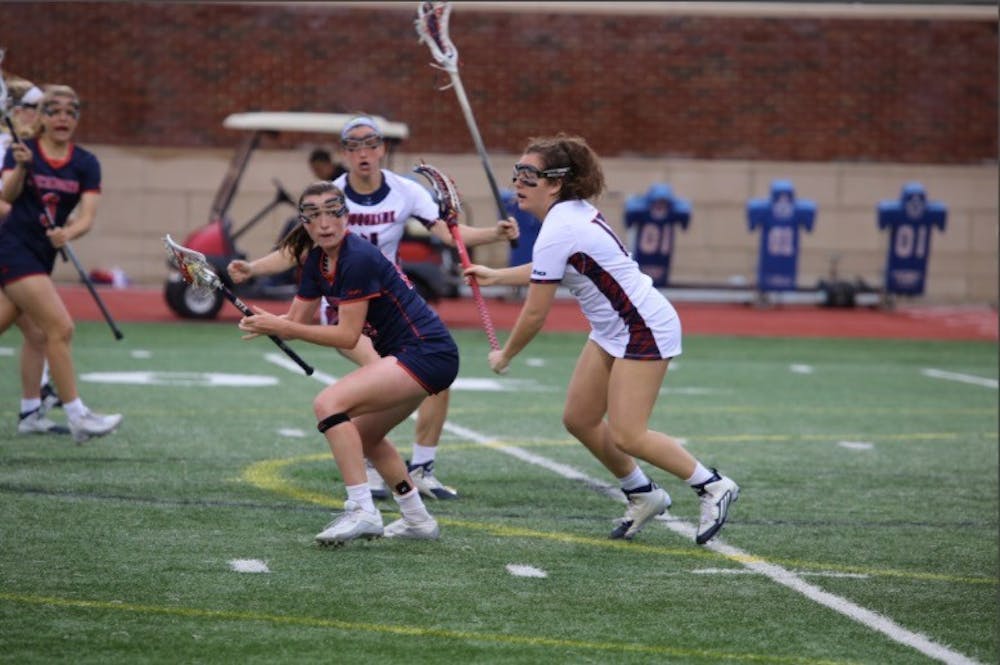Sarah Conley, Julia Cullinan and Tanner Lacey are among a small percentage of students who came to the University of Richmond as student-athletes but will now graduate as regular students.
Most full-time student-athletes come to the university committed to playing for all four years of college. Yet these Spiders said they had each chosen to take a different path for their own reasons.
After tearing her ACL in the first semester of her first year, Cullinan, a sophomore, decided she wanted to explore opportunities in college other than just being an athlete for the field hockey team, she said.
“Being a student athlete is very hard, balancing the aspect of working out, practicing and keeping up with your academics," Cullinan said. "I needed a broader experience."
Conley, sophomore, had a similar reason for quitting the women’s lacrosse team: a health issue that forced her to make a tough decision, she said.
“I have a disease called compartment syndrome, so I had to either stop playing lacrosse or face a grueling surgery, one that isn’t 100 percent successful, and it’s a long recovery,” she said. “I was really sad to have to stop playing, but it was something I had to do for my health.”
Although some athletes were forced with a difficult decision, there were others who decided it was time to explore other opportunities. Senior Kathleen Berkery knew deep down that she wasn’t fully committed to lacrosse anymore, she said.
“It was probably one of the hardest decisions I’ve had to make,” Berkery said. “I liked the team, but I just wasn’t mentally in it anymore. It was the weekend before second semester of my junior year, and I was so nervous to get back to campus but realized it was best for the team if I stepped down before the start of the season.”
Berkery stressed how hard it was to make this choice and said she missed the schedule that the sport had provided her.
“It gives you structure,” she said. “You know that you have lift in the morning for an hour, you're going to class till 1:15 p.m. and you have practice from 1:45 to 4:30 p.m., and then you shower, eat and do homework.”
Although this structure provided her with good time-management skills, Berkery said if she was having a tough day, whether with friends or academics, she still had to give 110 percent to her team, which was sometimes difficult to manage.
Lacey, a junior, realized he was not fully invested in the football team after he was no longer on the full financial-aid program that he had started with as a freshman.
Enjoy what you're reading?
Signup for our newsletter
“I had to pay a little more to go here, and I figured if I was giving 30 hours a week while being a back-up on special teams, why would I give that time when I needed to get paid?" he said. “Football used to be a full-time job, but I needed to find something different.”
Lacey, who intends to enlist in the military after he graduates, said he was actually busier now than before.
“My schedule is definitely more packed, but it’s nice because I choose to have that schedule," Lacey said. "I started doing jiu-jitsu. I coach wrestling and work out in the mornings."
Although many of these students unexpectedly chose to stop playing their respective sports, the one thing they all agreed on was that the response from their coaches and teammates was one of support.
“My coaches and teammates were very supportive of me and they felt badly because it was something that was out of my control and they knew how much I loved the game,” Conley said. “Nothing has changed, though, and I still have the same relationship with them.”
Senior Frank Cognetta said his teammates on the lacrosse team were the most surprised by his exit but that he still maintained a good relationship with many of them.
“I had an interesting role on the team," Cognetta said. "I was the 'rah rah' big energy glue guy on the sideline. I think they were hoping to see me finish my time here as a member of the team.”
LaRee Sugg, associate athletic director and senior woman administrator, said the athletic department recognized that not all students could play all four years. Only five to 10 student-athletes per year out of approximately 400 student-athletes choose to stop playing, she said.
“Based on my experience, the reasons are all very different across individuals and sports and are oftentimes for non-athletic reasons,” she said. “They may have lost their passion for competing, want to pursue other social activities, have academic concerns or family and financial issues arise.”
Unsurprisingly, all of the students interviewed answered that the biggest change since they had stopped playing was the amount of free time they had. For some, this has forced them to figure out their next steps.
"I definitely miss the structure that being a student-athlete gave me," Cullinan said. "Your life is basically organized for you, so not having a team to rely on for stuff was an adjustment."
Contact contributor Sophie Pilkington at sophie.pilkington@richmond.edu.
Support independent student media
You can make a tax-deductible donation by clicking the button below, which takes you to our secure PayPal account. The page is set up to receive contributions in whatever amount you designate. We look forward to using the money we raise to further our mission of providing honest and accurate information to students, faculty, staff, alumni and others in the general public.
Donate Now



